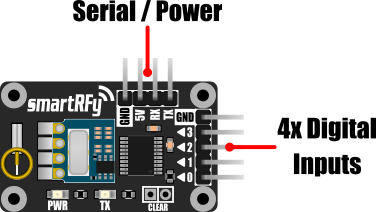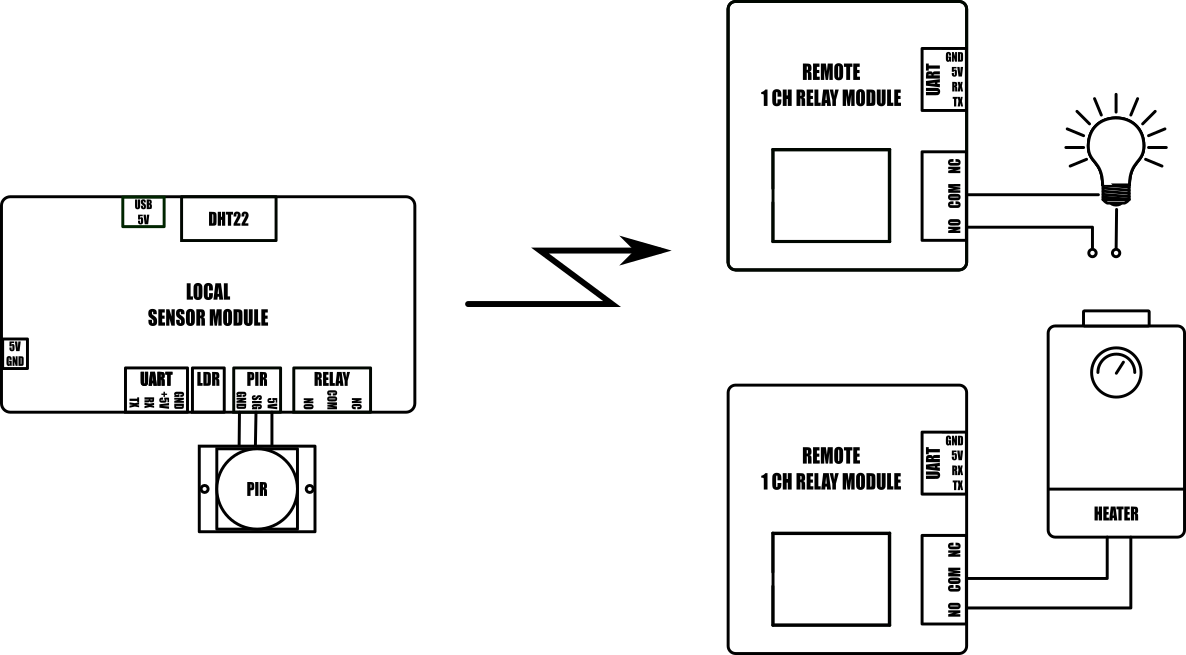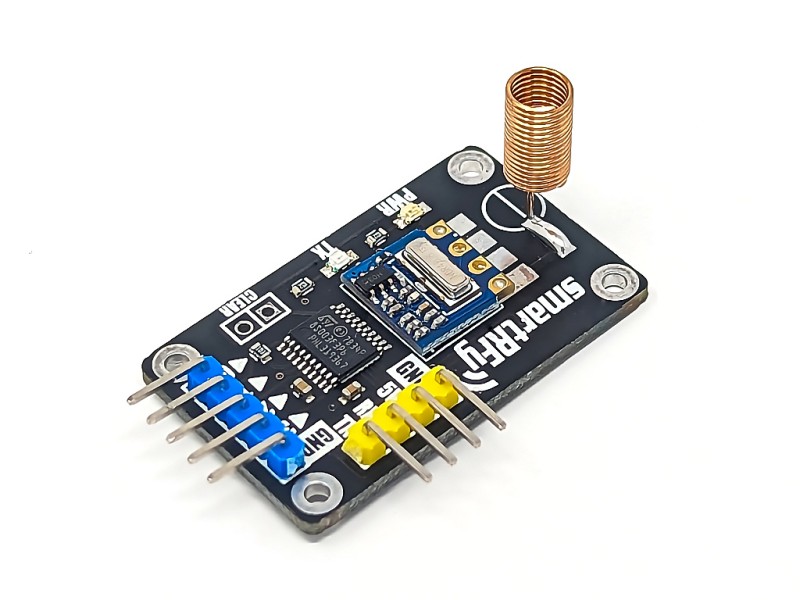SmartRFy Digital Tx Module
The SmartRFy digital Tx module provides a set of 4 digital input pins which can be used to remotely control other SmartRFy modules. In particular when coupled with the digital Rx module (HCMODU0142) each pin on the Rx module will mimic the state of the 4 digital input pins on the Tx module without needing any configuration. Similarly, the Digital Tx module can be used to directly control the relays on a 1, 2, or 4 channel SmartRFy relay module.
The SmartRFy digital Tx module provides a set of 4 digital input pins which can be used to remotely control other SmartRFy modules. In particular when coupled with the digital Rx module (HCMODU0142) each pin on the Rx module will mimic the state of the 4 digital input pins on the Tx module without needing any configuration. Similarly, the Digital Tx module can be used to directly control the relays on a 1, 2, or 4 channel SmartRFy relay module.
Like all SmartRFy modules it can even be used as a wireless serial port (transmit only) allowing for non SmartRFy devices to communicate with one another using a SmartRFy connection.
The module can be powered via a single 5V power supply, and standard 0.1” pitch header pins provide access to power, the 4 digital input pins, and the serial interface.
Features

• 4 independently controlled digital input pins.
• Can be used to directly control a SmartRFy digital Rx module or a 1, 2, or 4 channel relay module without requiring any configuration.
• Local and remote control via simple text based serial commands.
• Up to 255 zones and 255 addresses (default zone 0, address 0).
• Compatible with most microcontrollers featuring a serial UART interface.
• Wireless serial communication with 8 different baud rates (9600 default).
Specification
Product code: HCMODU0142
Supply voltage: 4.5 to 5.5V
Supply current min: 7.8mA (idle)
Supply current max: 19.3mA (transmit)
Operating frequency: 433MHz (OOK)
Operating range: 30 Meters (unobstructed)
Interfaces: RF Tx, serial UART, and 4x 5V digital inputs
Digital input pin characteristics:
Input logic low voltage: -0.3V to Vdd x 0.3V
Input high high voltage Vdd x 0.7 to Vdd + 0.3V
Digital Tx to Rx pin response time:
0.8 seconds (default settings)
0.6 seconds (TRS=0)
Module dimensions (WxDxH): 36.8mm x 22.1mm x 20mm
SmartRFy system overview
SmartRFy modules are a range of wireless modules that provide a simple low cost way of controlling and monitoring remote devices and sensors. They are designed to work at their basic level with no programming required. However, when reconfigured or controlled via their serial interface they can also provide more complex and even autonomous functions.
SmartRFy modules work by wirelessly communicating with one another using simple text based commands - for example, to turn on a remote relay a command such as RLY=1 can be sent, and to turn it back off RLY=0. These commands can be automatically sent from one module to another or can be sent by a user via a modules serial interface to manually control modules on the SmartRFy network.
They are addressable and can be grouped into one of 255 zones, with each zone capable of individually addressing 255 devices, giving a total of over 65,000 unique addresses. SmartRFy modules are designed to be both easy and flexible to use by providing three levels of control:
Zero configuration (out-of-the-box)

With no configuration at all the SmartRFy range of modules allow basic functionality such as remotely switching relays, digital pins, or monitoring sensors, such as temperature, humidity, light, motion etc. All SmartRFy modules default to the same zone and address and so can respond to, or control, other modules without the need to modify any zone or address settings.
Serial port configuration

All smartRFy modules include a serial port which allows them to be re-configured using simple text based commands. These text commands allow changing of configuration settings and control of specific features of each module. Any setting changes are stored by the modules non-volatile memory and so are retained even when power is removed from the module. When reconfigured they are able to perform more complex functions and even some basic autonomous tasks. For example, a SmartRFy relay module can be reconfigured to control a heating system based on the temperature transmitted from a remote sensor or, turn on a flood light for a set amount of time when triggered by a remote PIR – all without any additional hardware. Serial port configuration also allows a modules zone and address (all SmartRFy modules default to zone and address 0) to be changed. This provides the option for modules to be placed into groups, which will then only respond to other modules with a matching zone or address.
Slave controlled

Example 1: Turning on a remote relay with zone = 1 and address = 5

Example 2: Send plain serial text “Hello” to a remote microcontroller
SmartRFy modules can also be controlled via their serial port by other devices such as microcontrollers or computer based automation software such as Node-RED. Using a SmartRFy module as a slave device (must be capable of transmitting/receiving) gives a master device the ability to monitor and control any other SmartRFy devices on the network, regardless of their zone and address. SmartRFy modules can even be used as a passive wireless serial port for passing non-SmartRFy data to other remotely connected devices.
Downloads
The user manual for this module can be downloaded from our support forum at www.smartrfy.com




